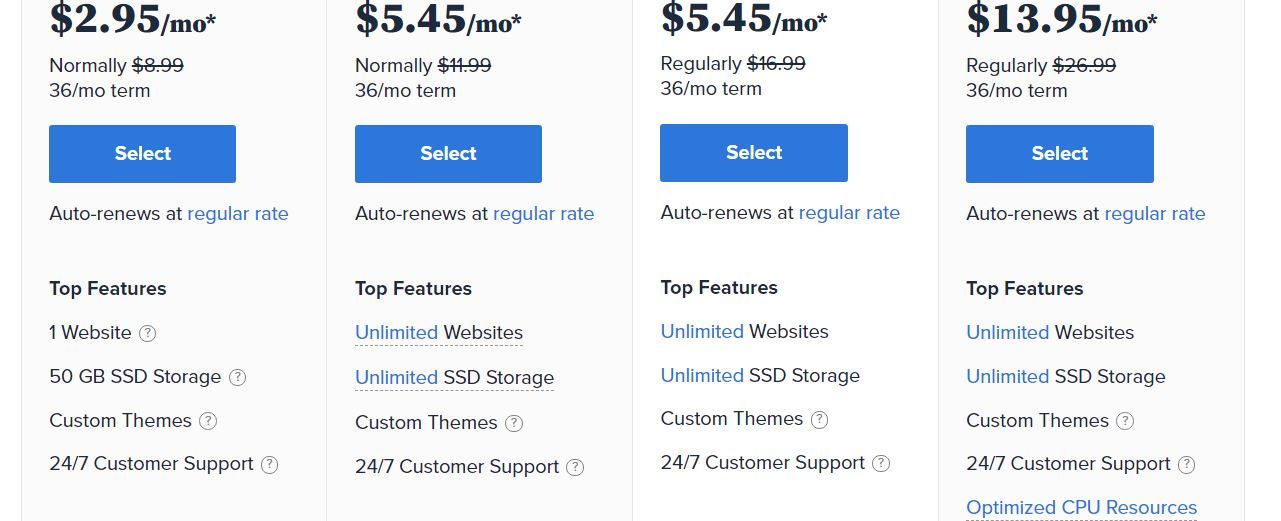Bluehost and SiteGround are significant players in the website hosting industry, and at first glance, the two are incredibly similar.
WordPress has endorsed both sites, and both cater to a wide variety of website hosting needs. Which begs the question, which of the two can rightfully take first place?
Here’s a stark comparison of what these two providers offer regarding price, hosting features, functionality, and security for WordPress hosting.
Price Comparison Between SiteGround and Bluehost
The Price rivalry between SiteGround and Bluehost is a complicated one.
SiteGround’s cheapest WordPress hosting plan is $3.99 per month. With 10GB storage capacity, ten thousand visits each month, daily backups, and enhanced caching included, the StartUp package from SiteGround offers many features for a low price.
On the other hand, Bluehost’s WordPress hosting prices start at $2.95 per month. The Bluehost Basic includes 50GB storage space, unlimited bandwidth, and a free domain. Besides that, Bluehost offers managed WordPress.
Many may, however, argue that a lower cost doesn’t translate to a higher value, which is partly true.
But as far as what you spend upfront is concerned, you get more server resources and a free domain with Bluehost for a significantly lower price. Since there aren’t many free web hosting providers, Bluehost is a considerably less costly option.
Bluehost and SiteGround's Hosting Features
When selecting a web hosting company, it’s vital to look at what features they provide. Here are some of the key features of both SiteGround and Bluehost.
Storage
How much room you have to work with is always a key consideration. It would be best to choose a hosting plan that allows for the storage of projects while still providing some breathing room.
That said, SiteGround offers 10GB for its basic plan, 20GB for its middle plan, and 40GB for its high-end plan. Bluehost, however, offers 50GB for its basic plan, while the rest of the plans have unlimited storage.
Bandwidth
This is the number of visitors that your website will be allowed to receive. More often than not, hosting providers will try to limit your traffic in a bid to force you to upgrade.
Luckily, neither SiteGround nor Bluehost are limited when it comes to bandwidth so that you can get as much traffic as possible.
Backups
If you’ve managed a website before, you know having a reliable backup system that you can quickly restore your information is more than necessary.
SiteGround keeps a daily copy of your site for 30 days, and you can restore it to a previous backup in a matter of seconds.
On the other hand, Bluehost charges you an extra $3 per month for a backup add-on for the primary and middle plans, but the add-on comes for free on the higher plans.
Domains, Subdomains & Parked Domains
SiteGround allows you to have as many subdomains as you want, and all of it's plans come with unlimited parked domain names. However, the platform won't provide you with a free domain name after registration. Bluehost takes the lead in this area.
With a free domain name that comes with all of its plans, Bluehost saves you about $16 per year, which is a rough estimate of what it costs to purchase a domain name. The basic plan limits both the number of subdomains and the number of parked domains to five and 25, while the other plans have no limits.
Bluehost and SiteGround's Site Speed
When it comes to website speed, SiteGround has the most up-to-date technology available. According to most speed test tools, this host has a Largest Contentful Paint (LCP) time of 0.8 seconds. Within this time, SiteGround loads all the critical parts of your website.
The LCP is vital in letting search engines and users know how fast your site is, and anything below 2.5 seconds is considered very good. So for an LPC of 0.8, SiteGround is right about as fast as it gets.
As for Bluehost, the LPC stands at 1.0 seconds. While this is still a good score, it's not quite as good as the performance that SiteGround offers. Simply put, SiteGround is the undisputed champion in the speed battle.
Downtime on SiteGround and Bluehost
Aside from the hosting speed, uptime is a critical performance metric for any web hosting provider. A good rule of thumb is striving for not less than 99.95 percent of uptime.
Both Bluehost and SiteGround meet and surpass this expectation, even though SiteGround ranks higher than Bluehost, averaging almost 100 percent uptime.
Bluehost and SiteGround's Server Location
For the server locations, SiteGround has more than one. It has six data centers across the world. These locations include the US (Chicago and Iowa), the UK (London), The Netherlands (Amsterdam), and Singapore.
When it comes to Bluehost, however, there’s not much information as to where or how many server locations it has. But the one frequently mentioned is Utah. So that seals it, SiteGround wins with six server locations.
Bluehost and SiteGround's Security
SiteGround's security is top-notch. It comes with SSL, SFTP, and SSH access, which are all important security-wise. The web host also uses PHP 7 by default to monitor the traffic and block brute force attacks.
To top it all off, it updates its security rules every week and sell an add-on called SG Site Scanner that will scan your site looking for malware at $1.50 extra per month.
Bluehost also offers a similar package with SSL, SFTP, and SSH access. It also provides an external security solution at an extra cost of about $30 annually.
Besides that, very little else is known about the platform's security protocols. But, it’s safe to say both providers are doing their best to secure their platforms.
Bluehost and SiteGround's Customer Support
In matters of customer support, SiteGround and Bluehost are very similar. Both providers have 24/7 live chat support, phone, and email options. On top of this, you get access to tutorials and documentation to help build your knowledge base for both.
SiteGround also has a help widget that appears on every page. Aside from that, whichever page you are on, you will find a list of the FAQs related to that page.
On the other hand, Bluehost has a dedicated support center where you will find several categories, such as FAQs, WordPress, domains, or email. Only slight variations exist in terms of the support offered by these two providers, so neither outranks the other.
Which Web Hosting Provider Is Best to Use?
While both SiteGround and Bluehost give your website the services it needs, they come with significant differences in several focus areas.
SiteGround, for instance, is a more expensive but also a more performance-focused option. Diversely, Bluehost is slightly less performance-focused, but what it offers at a significantly low price is impressive, and its ease of use, especially for beginners, cannot go unnoticed.
Your needs should be the determining factor in which provider you choose as your preferred host. Plus, if you’d want more variety, then you can shop around for the best WordPress hosting service before you make your choice.





